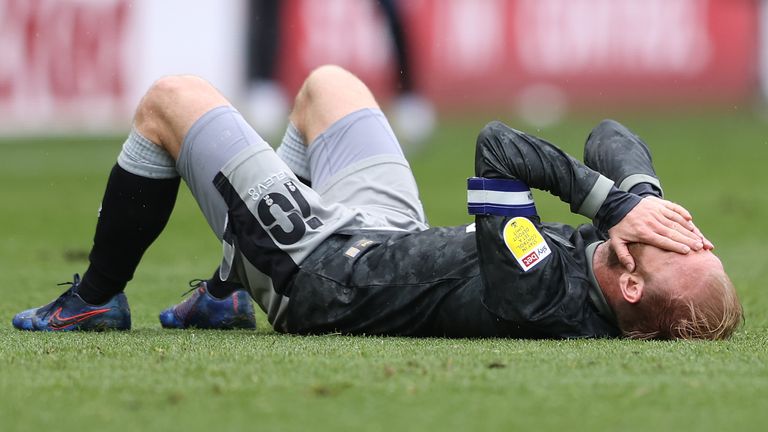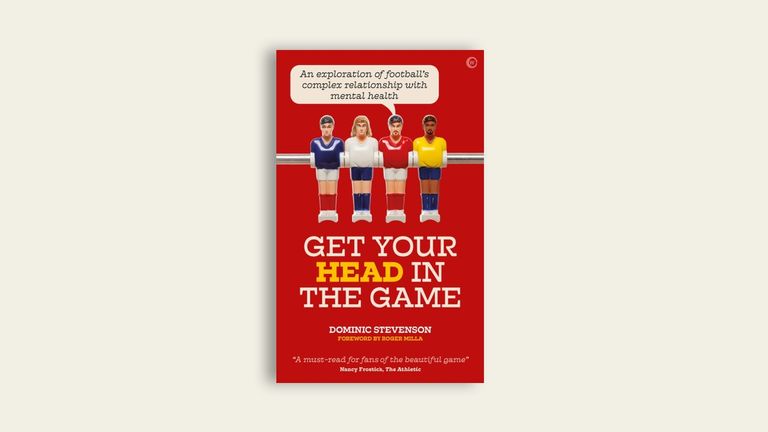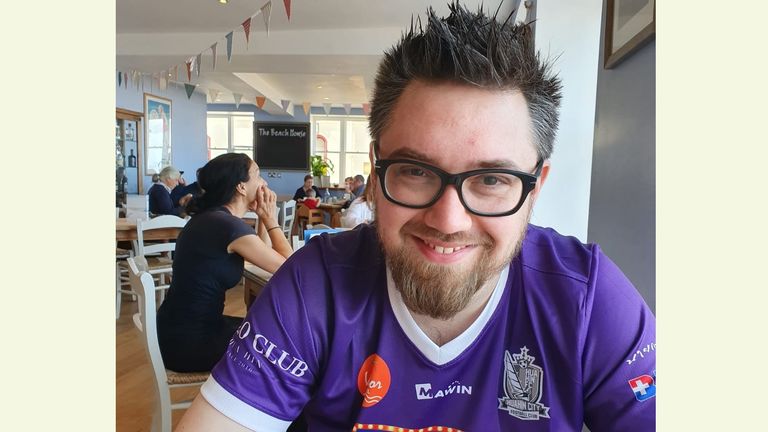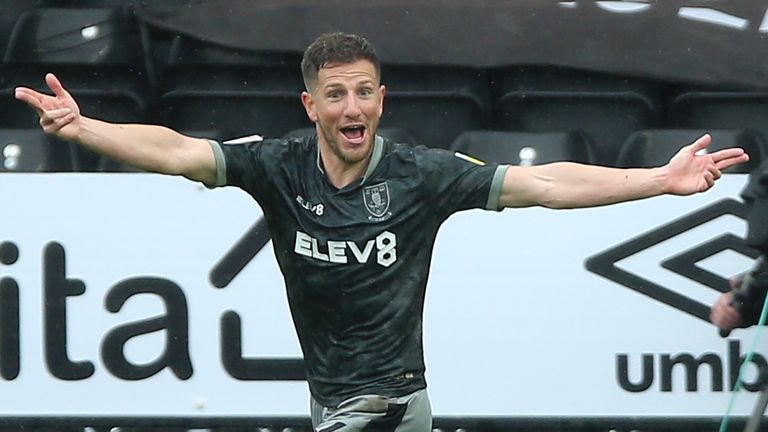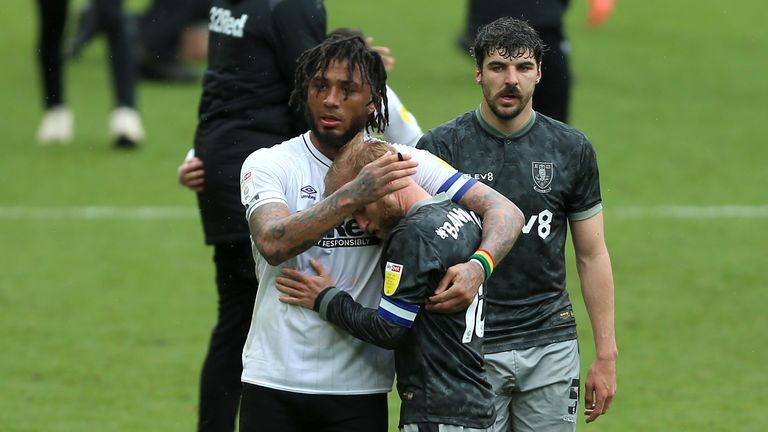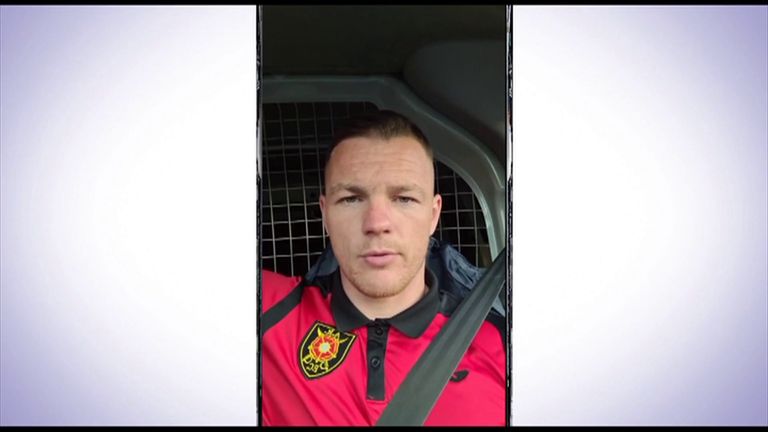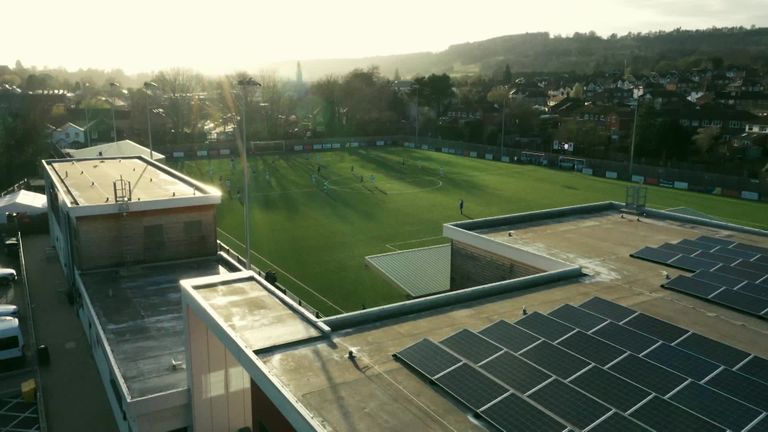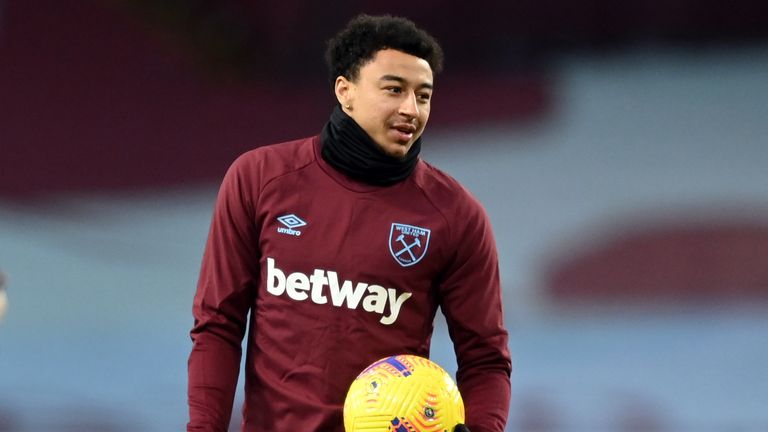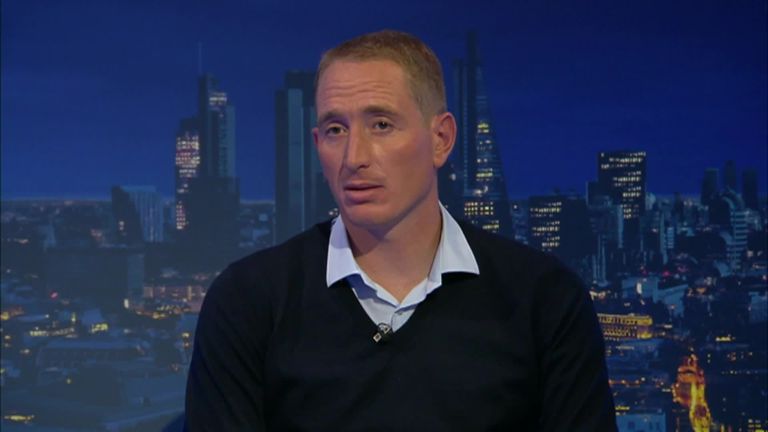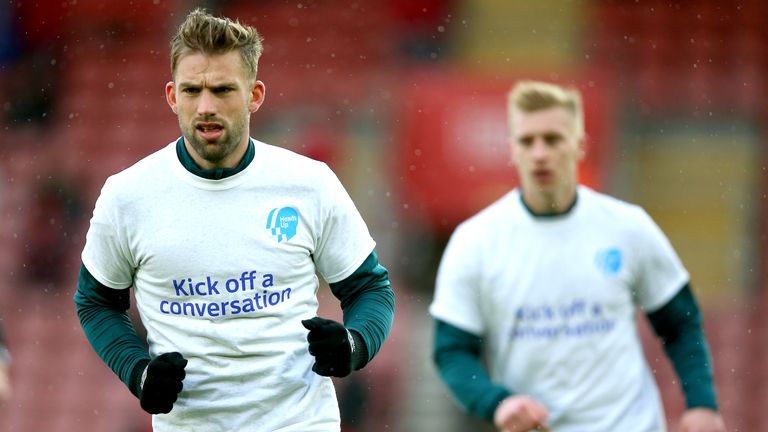Mental Health Awareness Week: Author Dominic Stevenson on relegation 'grief' as a Sheffield Wednesday fan, and football's changing mindset
For relegated clubs like Sheffield Wednesday and for their supporters, the drop always hits hard; Owls fan Dominic Stevenson - whose book 'Get Your Head In The Game' explores mental health in football - discusses what he's learned about handling disappointment, and the value of listening
Wednesday 12 May 2021 17:00, UK
Players with heads in hands, coaching staff with stiff upper lips, the opposition offering consolation handshakes... the scene at Pride Park at full-time on Saturday was a tapestry of final-day emotions.
It felt familiar but for the absence of fans in the stands, either sharing in the jubilation of staying up or going through the gut-wrenching, sinking feeling of relegation.
Derby's players later ventured outside the ground to dance and make merry with a gathering of supporters.
Meanwhile, the visitors from Sheffield Wednesday packed up their troubles and left, as the Owls faithful vented their views and commiserated with each other on social media and messageboards.
Among those fans watching from afar was the author Dominic Stevenson, whose book 'Get Your Head In The Game' was published in December 2020. An exploration of football's complex relationship with mental health, the book contains powerful interviews with professional players past and present such as Chris Kirkland, Sam Hutchinson, David Cox, and Ella Masar, as well as those in other roles. All share experiences, opinions and self-analysis, interspersed with those of Stevenson himself.
We learn of his childhood growing up in Grimsby, inheriting a love of Wednesday from his father, playing for a Lincolnshire juniors team that once travelled to Nepal where they were mistaken for an official England side, coaching in Edinburgh where he now lives, and how his own mental health peaks and troughs have been affected by the undercurrents of football.
It's both honest and illuminating, and in Mental Health Awareness Week - arriving at the business end of the football season, when every kick or miss of a ball seems to matter more - we asked Stevenson to discuss relegation, the importance of reaching out, the women's game, and community…
Sky Sports: Congratulations on the book, Dominic. What was the starting point that got it all underway?
DS: I love football. I always have. Sheffield Wednesday have just been relegated, and I took it as hard as I took it seeing us lose to Arsenal in two cup finals in 1993. It's a horrible form of grief, but I've seen so many beautiful sides of the game that however bad I might feel about us going down, I knew there's a lot of good out there in football.
I remember being at the Steel City Derby in November 2018. Wednesday had been on a poor run and were expected to lose against an excellent United team who ultimately got promoted. Fifteen minutes into the game, our young goalkeeper, Cameron Dawson, saved a penalty and the crowd roared with excitement, everyone was chanting his name, and his name began to be engraved in Wednesday folklore.
A few minutes later though, he absolutely spooned a clearance into the stand and people started screaming the most terrible abuse at him.
This made me think - how is this good for the mental health of not only the player, but of the fans stood around me? I know football is a way that people have always used to vent frustrations but this seemed too much for me. It seemed like unbridled fury that was constantly bubbling under the surface.
I've been going to football for over 30 years now, and I've always known it was there, but this time it sat uneasily with me and so I began to think about what I could do to try to support and improve the mental health of fans.
What did you learn about yourself and your own journey from the writing process?
I'd always considered myself reasonably evolved, and someone who was always keen to learn more, to speak to people and to understand how my actions affected others so I could become a better and more positive member of society. Once I started writing the book though, I realised just how wrong I was.
I was evolved to an extent, but I wasn't always as active as I could be in speaking out. I didn't have a positive grasp on my own mental health either.
Since writing the book, I've undertaken fortnightly wellbeing and therapy sessions to improve my mental health. I'm doing fine at the minute, so I sort of see it like taking vitamins. It gives me the strength and understanding to cope when bad things inevitably happen.
An early chapter, 'The Battlers', features an interview between yourself and Wednesday defender Sam Hutchinson. He describes speaking about mental health on a local radio show and inviting people to contact him - but no one does. Yet the conversation you have shows how relatable he is. How do we best create opportunities within football that offer chances for people to open up?
Sam is one of the bravest and kindest people I've ever met and without him, I don't think the book would exist. He showed belief in me and my work, and he was really the first external validation for the project. I could never thank him enough, and I can guarantee he felt genuinely saddened no one got in touch on that occasion.
Creating opportunities for football fans to talk about their mental health is vital, but I do believe that many opportunities are out there. Instead, it's about supporting people to take them. We often forget that many football fans are of a generation that grew up being told to 'get on with it', and that sticks with you.
Despite the money involved in the game now, most football fans are working-class people who grew up in working-class areas and didn't receive the support growing up to help them manage their mental health.
Evolution will be the way forward. We see every week online, a fan suffering and there is a huge outcry of support from other fans - but I don't think this translates to self-reflection and self-care. What it does is it continuously shines a light on the worst-case scenarios and while that's the case, I think we'll struggle for the real change in mindset that is needed to happen quickly.
We live in a nation where a leading politician famously decried the need for 'experts', so how can we as a country expect people to be confident in accessing the support they need when leading politicians tell them that experts won't help them?
We need societal change beyond the terraces and once that happens, the microcosm of society that a football stadium is will reflect that change.
Football fans need examples of players who have normalised going to therapy, of fans who normalise going to therapy, or taking anti-depressants. They need to see that mental health support isn't just crisis management but it's as important as a good diet.
What were your thoughts on David Cox's recent decision to quit and the events around that, having spoken to him for the book? He said "football is one of the most dangerous places you'll ever be in" for someone who has suicidal thoughts.
I have to be honest, I wasn't surprised at what happened to David.
My instinct is that the player in question felt he could gain an edge over an opponent by winding them up. If so, that demonstrates that we as a society have gone wrong.
If we must win at any cost, if we must win by literally risking the life of our opposition, should we even be playing the game?
I saw David's video live on Facebook as we're friends on there and as I watched it, I cried and got increasingly angry as I did so. Seeing such a good person allegedly victimised like that because of his mental health is a terrible experience - though I have a feeling that what has happened to him has set off a positive chain reaction within Scottish football.
More fans are talking about mental health, clubs are being forced to take action on mental health, on top of some of the fantastic work that is already happening. Aberdeen for example have provided all of their supporters with free access to mental health apps and resources throughout the pandemic. The Spartans who I coach with have provided food, clothing, household equipment, and much more to their local community, and so on.
I hope what happened to David will speed up this process.
What should players be more mindful of?
I found from my research that once you leave the top league, the mental health support drops off. Sam Hutchinson spoke about the incredible resources Chelsea made available to their players, but when he went elsewhere, he had managers questioning his injuries instead of supporting him.
I fear that particularly ex-footballers are at great risk with their mental health. They've been brought up in a bubble from the age of five or six, never let out into the world and yet not properly supported within the game. Then it's all over and they feel lost, many marriages break down, and after being the centre of attention for a decade, they're yesterday's news and they may have no one around to help them.
More work needs to be done by the PFA and others - although I do hugely respect the work the PFA is currently doing - to actively reach out to players who've left the game. They're proud individuals and may well fear the stigma of seeking mental health support so in the instance of players, they must be reached out to in their homes.
Former USA internationals Kelly Lindsey and Ella Masar are interviewed in a chapter in the book titled 'Revolutionaries' - both are very familiar with different types of discrimination that women face in football. As the profile of the women's game increases, what additional pressures could come as a result of that, and how can we all be better allies?
The increasing popularity of the women's game means players are under a much greater spotlight, and there is increasing interest in their personal lives.
To be better allies to the women who play football, we must again be proactive in our support for them to live the lives that make them happy.
A few years ago, a Crystal Palace player had her personal cloud hacked into and intimate images were stolen from her. These recently came to light after someone criminally shared them on adult websites.
The women's football community rallied around the player, called on action to be taken by websites and social media outlets, and individuals tirelessly rebuffed every troll who came out from under their bridge to defend the player and her right to privacy.
It showed a real strength of will from the fan community, from the journalists and media outlets who write about women's football. It also sadly showed that the women's game is being increasingly targeted for the same kind of abuse and hateful coverage that should have died out a long time ago.
To be better allies to the women's game, we all have to start by watching and learning about it, using media outlets that display the women's game in all its glory and show us all not just its potential but its huge successes.
We have to invest in the game emotionally, otherwise we're just another talking head. Once we emotionally invest, we will not only put more of a spotlight on the women's game, but we will also as a community show the values which the game has.
Diversity, inclusion, love, friendship, support - if we embody those, we'll be the allies the game deserves, and we'll have plenty to cheer going forward.
You speak to 'The Secret Footballer' who is very matter of fact about tackling mental health problems in the men's game - he says "we must go to the players, not the other way around". We know people in football are very cagey about giving away information they consider private and personal. Is creating environments where anonymity is respected a way to do that?
I'd argue that we need more players to come out publicly with their mental health challenges, for the good of the wider community - but long before they reach crisis point. Clarke Carlisle and Aaron Lennon are both players who only spoke publicly after a crisis and after being forced to some extent by the media coverage of their crisis.
I was pleased to see Jesse Lingard speaking of his mental health recently, and he's shown that you can suffer and still be at the very top of your game.
As fans, we need to reject the media exploitation of mental health crises and to provide positive feedback and reinforcement to those who do speak out. However, we must never get to the point where we criticise those who don't speak out because after all, it's a health issue and we have no right to know.
The line between role model and individual is a tough one to walk and we should embrace what people choose to share, and leave well alone what they don't.
"I decided I'd rather be a martyr and struggle on" is a quote from Chris Kirkland in the book - it sounds like something a lot of men might say when it comes to mental health. What are the signs to watch for that let us know ourselves or someone else is suffering?
When people become withdrawn, it can be very challenging to be around them. It's hard to make conversation, to have fun, and sometimes it can be difficult to see why you should make the effort.
I would say most of the time, if someone is being like that, it's because they don't know how to say what they want to say.
That's why my top tip for helping someone begin their mental health journey is to listen. Yes, it sounds lazy as anything saying that - but it's true. Men are often reluctant to open up due to the fear of ridicule, so listening, and actively listening, gives them the opportunity to begin to talk.
Many mental health advocates say that talking is how to solve challenges, but for me, it's listening. We're told in campaigns, by Prince William and by so many others, to talk - but so often, people don't know how. That's why listening, letting silence reign if it has to, is vital.
Space is needed when people are trying to articulate thoughts they have never shared before and so if you sit there gabbling away, even with the best intentions, people won't have a chance to open up.
In my book, I talk about many other ways to improve your mental health, and one which I have had to rely on recently is building my own football community.
During our road to relegation, I found myself engaging online more than ever with other Wednesday fans. We talk, share memories, and we've built friendships.
When we went down, lots of fans were all sharing their sadness, anger, their infuriation with the team and the club, but we were together as one. So despite the grief - and it is grief - of something like a relegation happening, I had thousands of people to commiserate with instead of being alone.
I saw many people lash out, and while I felt more sadness than anger, I could understand why they felt that way. The only judgement came when a small minority ventured into abuse and threats against players and club officials, but besides that it was a diverse group with a single uniting passion grieving together.
It provided me with solace and it helped me get excited for the season ahead within hours, instead of wallowing in the sadness of it all alone.
Thanks to Dominic Stevenson. 'Get Your Head In The Game' is available to buy now from Watkins Publishing.
Mental Health Awareness Week runs from May 10-16.
